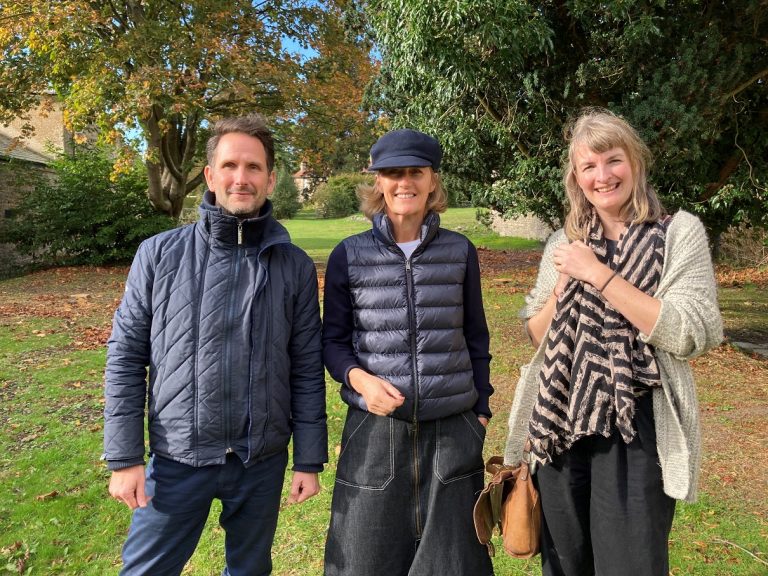Hull University Business School secures prestigious small business charter
Hull University Business School has been awarded with the prestigious Small Business Charter.
The accreditation recognises the high quality of support and advice the Business School provides to SMEs across the region, and its support of the local economy.
Crucially, it also enables the Business School to deliver the Help to Grow Programme – a 12-week intensive course for SMEs which covers areas including leadership, innovation, digital adoption, employee engagement, marketing, responsible business, and financial management.
As the first provider of the programme in the East Riding of Yorkshire, it provides SMEs with a unique opportunity to upskill their business and drive growth.
Professor Stephen Hardy, Dean of the Faculty of Business, Law and Politics at the University of Hull, said: “We are delighted to be awarded the Small Business Charter and to be part of the Government’s ‘Help to Grow’ initiative.
“This will enable us to fulfil our mission to help rebuild of region and to support our local businesses to grow and prosper in 2022 and beyond.”
The University was assessed for the Small Business Charter in 31 different areas, focused on three key themes – helping small businesses grow, engaging with key stakeholders and encouraging students to be entrepreneurial.
The Business School scored 24/31 – well above the 12/31 required to be awarded with the Small Business Charter and deliver the Help to Grow programme.
SMEs wishing to embark on the 12-week programme pay just £750 – the remainder of the cost is funded by Government.
As part of the programme, SMEs also receive personalised business mentoring and will have the opportunity to work with students in the Business School to gain new ideas and insights.
Dr Dave Richards, Pro-Vice-Chancellor for Research & Enterprise at the University of Hull, said: “This Chartership is a significant vote of confidence in our Business School as being a pivotal stakeholder in the local economy, supporting SMEs and global businesses alike and providing a talent pool of future skilled employees.
“Crucially, the Chartership means we can expand our offering to businesses through the Help to Grow Scheme – at a time when economic instability has perhaps never been greater, we are delighted to be playing our part in helping businesses to expand and succeed.
“Students at Hull will also have the opportunity to share their knowledge and ideas with real businesses, gaining invaluable experience and contacts in the process.”
Hull University Business School submitted a number of examples of its business engagement and support as part of the application for Small Business Charter.
Included in that was the University’s Small Business Clinic – piloted last year – which sees Business students work with SMEs to help identify areas of growth and talent.
Also highlighted were a series of live projects which students at Hull can get involved in during their degree – working with companies including Cranswick, Atom Brewery and Enterprise Rent a Car.
Finally, the Business School’s ‘Entrepreneurs of Residence’ scheme was showcased to assessors. The project sees SME leaders work with the University to lead workshops and talks, sharing their experiences and bringing together networks of professionals.
The University is now looking for SMEs in the region to engage with the Help to Grow Programme.
Holiday park given green light for £200,000 new development
Wayside Holiday Park, in the heart of the North Yorkshire Moors, has been granted planning permission for a “game-changing” new development.
Ryedale District Council has approved plans for Wayside to create 13 new pitches for luxury caravans and lodges in the centre of the park.
The £200,000 state-of-the-art development means the end of seasonal touring caravans on site.
Owner Mark Goodson explained this was a “transformational move,” taking Wayside up-market and breathing new and exciting life into the holiday park, creating a quality environment in its heart.
“This is a crucially important development for us – and we are grateful to Ryedale District Council’s planners for giving us the green light. We are confident that the demand for our new pitches is there, given the staycation boom and the tremendous success of our up-market Lakes development at Wayside, where we have sold 36 out of 37 lodges.”
Work has now begun on the new development at Wayside and is scheduled to be completed by August, when the park opens for the new season.
Two promotions at Leeds architecture practice
Leeds-based Brewster Bye Architects has promoted Andrew Chapman to associate director and Waqar Hussain has become a fully qualified architect at the firm, after successfully completing his RIBA part 3 exams.
Andrew joined Brewster Bye in 2013 and has worked on a wide range of projects from hotels through to residential conversions throughout Yorkshire and beyond. He’s also recently been involved with several high-profile student accommodation schemes including the eight storey Oasis Residence just off Millennium Square, in Leeds city centre, which consists of 96 high specification, self-contained studio apartments, as well as amenities.
Andrew has also designed and recently secured planning permission for another major student accommodation scheme in Nottingham’s Southside Regeneration Area, that will offer 297 bedrooms.
Waqar joined Brewster Bye in 2018 as an architectural assistant after completing a master’s degree in architecture at the University of Huddersfield and winning several awards including the West Yorkshire Society of Architects Award and the RIBA Yorkshire Student Silver Award. He’s now completed a Professional Practice and Management in Architecture (RIBA part 3) qualification to become a fully certified architect.
Since joining Brewster Bye, he’s been involved in several key projects including Leeds City Village and the successful planning application for Barkerend Mills, which is a Grade-II listed mill complex close to Bradford city centre. The complex had fallen into a state of disrepair but planning permission has now been granted for it to be transformed into 117 new apartments.
Andrew Chapman said: “This promotion will see me leading on several exciting projects, across numerous sectors, from the feasibility stage right through to completion, so it’s a great opportunity for me. In recent years it’s been a privilege to be involved in a such a variety of schemes throughout the north of England and I’m looking forward to building on this further in this new role.”
Mark Henderson, director at Brewster Bye, said: “Andrew has played a key role in all types of successful projects in recent years. He has a fantastic eye for detail and an excellent understanding of both the planning system and crucially, what planning committees want to see, which makes him very popular with clients. He thoroughly deserves this promotion.
“Since joining us nearly four years ago, Waqar has built up a wealth of experience designing high quality and functional homes throughout the region, and he’s worked hard to pass his part 3 exams and become a fully qualified architect. There’s no doubt he has a fantastic career ahead of him with us.”
Leeds estate agent makes director promotion
Leeds estate agent, HOP has promoted Neil Dawkin to director of its specialist property investment division, known as HOP Investments.
Neil has more than 20 years’ experience in the property industry spanning development, investment and property management.
He joined HOP in 2010 and has since established a strong track record for optimising properties for landlords and overseeing successful refurbishment projects, as well as advising clients on investment opportunities and HMO regulations.
Luke Gidney, Managing Director at HOP, said: “Neil is a hugely experienced property professional and is renowned for providing honest and reliable advice that genuinely adds value. This makes him popular with both new and experienced investors, regardless of whether they are looking to acquire a single rental unit or dozens of properties across Leeds.
“He will now be instrumental in us building on our client base of active investors and those considering development projects, and there’s no doubt his background and experience will continue to prove invaluable to property investors in Leeds.”
More than a third of firms report fraud increase in 2021
Eight in ten (84%) mid-sized businesses in the UK experienced fraud in 2021, with more than a third (37%) of companies reporting an increase on the previous year, according to a new survey from accountancy and business advisory firm BDO LLP.
Average losses totalled £223,000, with the professional services, leisure and finance sectors the hardest hit. Almost a third (30%) of firms reported suffering security breaches through cyber-attacks over the last 12 months.
BDO’s Fraud Survey – which monitored fraud trends at 500 mid-sized UK firms throughout 2021 – found that while one third (33%) of these frauds were externally generated, the majority (38%) involved collusion between internal and external individuals, while more than a quarter (29%) were committed against companies by their own employees.
The ongoing impacts of the pandemic and associated lockdowns have exacerbated the risk of being targeted by fraudsters, with many citing the shift to remote working as a driving factor. Of those surveyed, approximately nine in ten (89%) business owners and directors think their company is more exposed to fraud since 2020, while almost a quarter (23%) believe their exposure has “significantly” increased. The overwhelming majority (89%) said fraud risks at their business have increased as a direct result of home working.
With millions of employees continuing to work from home – often without access to workplace IT support – the threat posed by scammers remains heightened. However, businesses with employees working on-site also remain vulnerable, with considerably more than half (67%) of the firms impacted by fraud reporting that their employees had predominantly operated from the office or work premises over the last 12 months.
Despite the rising number of frauds committed against mid-sized firms, a quarter (26%) of business owners think the level of fraud awareness among their employees has declined since the onset of the pandemic as fraudsters deploy increasingly sophisticated tactics. Nevertheless, six in ten (63%) of the businesses surveyed have not implemented fraud awareness training programmes for their employees over the last year, while one in five (21%) don’t have a fraud response plan in place.
Looking forward, almost three quarters (69%) of company owners and directors are concerned about their business being targeted by fraudsters over the next 12 months – with 15% stating they are “very concerned.” However, 85% said resource constraints as a result of COVID-19 disruption will limit their investment in fraud detection and prevention tools over the coming year.
Commenting on the findings, Kaley Crossthwaite, head of fraud at BDO LLP, said: “Despite impacting so many businesses and individuals, fraud remains under reported, under investigated and under prioritised.
“Ongoing disruption wrought by the pandemic – including home working which has added complexity to the process of identifying and defending against cyber-attacks – has magnified the risk for businesses. The increasingly sophisticated and opportunistic tactics being developed by fraudsters have also outpaced the protections being implemented by many firms.
“As organisations re-evaluate their hybrid working models for the year ahead, they should pay particular attention to robust internal controls, including strengthening their fraud risk management programmes to lessen their exposure to financial crime.”
Super allowances having limited effect on UK corporates, says tax expert
Too few SME businesses are yet taking advantage of super allowances for the incentives to have any positive effect on the wider UK economy, according to a leading tax expert.
Becky Maguire, Tax Partner with UK Top 10 firm Azets in Yorkshire, describes the introduction of super capital allowances during the Spring Budget 2021 as an unexpected boost to companies, but there is a risk of the relief having little impact unless more businesses start using the enhanced tax deduction before it is withdrawn in 2023.
The super allowances available include the super deduction, a 130% first-year allowance for expenditure on main pool qualifying assets such as machinery, furniture, fittings, computers etc, and the enhanced special rate, a 50% first-year allowance for assets including integral features in buildings such as electrical, water and heating systems.
These are in addition to the existing Annual Investment Allowance (AIA) which permits 100% relief for up to £1 million of expenditure incurred each year on qualifying plant and machinery assets, until 31 March 2023.
According to the Office for National Statistics (ONS) the uptake rate of the super deduction scheme still remains unclear but “early evidence suggests super deduction claims are building more slowly than expected”.
Becky Maguire, Tax Partner at Azets, said: “Business investment accounts for a significant part of GDP and is crucial to boosting long-term growth and productivity. The introduction of the super deduction was positive for many companies as it has no upper limit and broad eligibility across a range of assets.”
“The lack of uptake of super allowances is likely due to a number of factors. Uncertainty plays a part, with the ever-present threat of stricter Covid measures impacting retail and hospitality businesses in particular. We know that some businesses are also struggling to accelerate expenditure due to supply chain and project management issues and with the super relief set to expire in just over 12 months, may not be able to accelerate their spending to take full advantage of it.
“With the Chancellor set to make his Spring Update speech on 23 March, it will be interesting to see if he decides to extend the window for the super deduction further and / or narrow its application to focus on greener assets.”
Becky Maguire is urging businesses to review their ability to invest now and use the incentives available to them whilst they still can.
She concluded: “Business owners should look carefully at the timing of planned investment in new assets to take full advantage of the enhanced allowances. Up to 31 March 2023, the additional tax savings through super allowances will be most beneficial to companies that have already absorbed the 100% relief available through the AIA. Businesses should seek professional advice from specialist firms to maximise and accelerate the available tax incentives.”
North Yorkshire architect secures historic Raby Castle contract
Acclaimed landscape architect Alistair Baldwin has been brought in to redesign the extensive public areas around Raby Castle’s landmark new development, The Rising, which will see several historic buildings sympathetically restored to their former glory and be made available to the community and the wider public.
The Richmond based specialist has been retained by Raby Estate owners, Lord and Lady Barnard, to recapture the sociable community feel of Old Raby village, which existed beyond the castle walls.
The extensive redevelopment of the buildings that will comprise The Rising will be tied together with thoughtfully designed landscaped areas.
The Duchess’ Walk – a corridor of statuesque trees and soft planting that will connect the restored buildings to the new visitor arrival hub The Round House, and lead to the rest of the castle, park, and gardens.
A central terraced garden which will be surrounded by buildings including the new Round House and Vinery restaurant, has views of the spectacular 700-year-old castle beyond and will draw visitors in through a new entrance, bringing a village centre to the scheme.
Alistair Baldwin said: “Our plans focus on providing the local community with beautiful spaces to meet and mingle, and the way we have designed those spaces evokes the sense of a traditional village connecting the various elements of The Rising together, providing sociable spaces where people can come together, shop, dine, meet and enjoy the gardens.
“The scheme will utilise reclaimed materials from around the estate to create a space which is authentic and sympathetic to its surroundings. Raby Castle is a dramatic landscape, and the scheme aims to open up a whole new vista to the castle which hasn’t been seen before. It holds a special place for me as a local lad, so it has been an absolute honour to bring Lord and Lady Barnard’s vision to life with these new designs.”
Lady Barnard said: “We have been working together on these plans since 2018 and hours of planning and thought have gone into these designs, so I will take great pride in seeing them come to life. I want to create something beautiful in an area of the castle that has been relatively neglected for decades.
“This is an incredibly important piece of the development work for Raby and carries with it a great deal of responsibility. This is not only my family’s legacy, but a legacy for the local community as well.”
World-class Italian garden designer Luciano Giubbilei has also been selected to lead the extensive remodelling of historically important Walled Garden at Raby Castle.
The garden was originally designed to supply the castle with fresh produce but was later developed more formally into a pleasure garden for the family. The plans will redesign and develop the ornamental gardens to provide a magical outdoor space where visitors can move through exquisite planting or attend performances and events.
Lady Barnard explains: “The planting and structures have now been agreed and Luciano has travelled across Europe to find the very best plants for the garden. The iconic yew hedges within the current garden will remain, as they are a real talking point and fortunately Luciano loves them.”
RWO Associates announces new Leeds office appointment
Ganesh Thapa has joined RWO Associates as head of the structures team in Leeds in a move that will see him working alongside the senior management team on planned strategic growth, new business development, account management, and developing a team of engineers and technical specialists.
A chartered member of the Institution of Civil Engineers and a lecturer for the IStructEMember Examination course (Yorkshire Branch), he will also be involved closely in stafftraining, technical compliance for designs and pushing forward with workflows acrossfrontline operations.
Bringing more than 30 years’ experience working on a variety of engineering projects to the role, Ganesh has extensive expertise in managing, leading and delivering multi-million pound construction schemes in the commercial, industrial and education and sports and leisure sectors.
Head of Leeds office Andrew Fairburn said: “With his leadership and project management skills, Ganesh will be a key addition to the senior team as we continue to expand our presence across the north of England and nationally this year, while also delivering the highest standards of service and engineering solutions to current clients.”
Brunswick Arcade: update to ongoing works
Major regeneration works continue to progress at Brunswick Arcade to bring this large-scale landmark building back into full economic use. The scheme will create new residential accommodation over ground-floor retail units and will deliver a new frontage that is in keeping with the local Conservation Area.
The works, which will contribute significantly towards the regeneration of the historic Beverley Road area, will replicate the original arcade through use of traditional materials, and will work to reflect the grand scale of the original design.
Stabilisation and hand-demolition works are currently under way on site and are expected to be completed before spring 2022. The stabilisation process is critical to ensure the long-term future of the building and involves the installation of both metal restraint straps and threaded metal straps to the brickwork at the first and second-floor levels. Once this is completed, construction work will begin on the building’s façade, which is anticipated to be completed by winter 2022.
Councillor Daren Hale, Leader of Hull City Council, said: “It’s exciting to see the progress that has been made on the Brunswick Arcade, and I’m sure everyone in the local area is looking forward to seeing the arcade being restored to its former grandeur – as well as bringing in new spaces for business and residential options.
“We want to thank everyone for their patience and co-operation so far with the project, and road users and pedestrians for following advice and guidance when travelling around the arcade area.”
Road users are reminded to expect delays and are encouraged to avoid the area at peak times where possible. The area between Norfolk Street and Trafalgar Street on Beverley Road is reduced to two lanes, meaning that all vehicles will share the carriageway. Traffic flow is being maintained in two directions, with one lane northbound and one lane southbound remaining open throughout the works.
Pedestrians are also reminded to follow all signage and to cross Beverley Road at the pedestrian crossings, which are signposted clearly around the area of the works. Local businesses remain open as usual, which is highlighted on signage around the works.
The restoration is part of the Beverley Road Townscape Heritage Scheme, funded by the National Lottery Heritage Fund and Hull City Council.
David Renwick, Director of England, North at The National Lottery Heritage Fund, said: “Investing in heritage means investing in the community it belongs to, which is why we are delighted to see the progress to Brunswick Arcade as part of the Beverley Road Townscape Heritage Scheme.
“Thanks to National Lottery players, this will not only preserve this important heritage to be enjoyed by locals and visitors from further afield, but will also play a significant role in boosting the local economy and aiding the wider regeneration of Hull.”
Mayor of West Yorkshire launches Green Jobs Taskforce
Experts from across the region have set out a roadmap for future jobs to tackle the climate emergency by launching the Green Jobs Taskforce.
The Green Jobs Taskforce, chaired by Tracy Brabin, Mayor of West Yorkshire, met yesterday bringing together experts from business, education and training, and the third and public sectors. The taskforce began its review of the landscape for green jobs and skills in West Yorkshire and decisions were made on how to reach its goal to position West Yorkshire as a leader for green skills and jobs and set out a roadmap to deliver the skills and jobs needed to address the climate emergency.
They also discussed key themes for the next twelve months, including the development of the Mayoral Green Jobs Gateway, which will create 1,000 well paid, skilled, green jobs for young people and ensure that West Yorkshire has the pipeline of talent needed to realise its ambitious target of becoming a net zero carbon economy by 2038 with significant progress by the end of the decade.
Estimates show that West Yorkshire has the potential to create over 70,000 good, new, high skilled jobs in the green economy by the middle of the century, and 40,000 of them by 2030.
Tracy Brabin, Mayor of West Yorkshire, said: “Today was a step forward to achieving our ambition of becoming a net zero carbon economy.
The West Yorkshire Green Jobs Taskforce, a group of professionals with great influence and direction, have today agreed on the next steps needed to improve our green economy and deliver on my pledge of creating 1,000 well paid, skilled, green jobs for young people.
This is a cause that I am passionate about. It’s crucial we act now and get this right for the people and businesses of West Yorkshire, and the future generations in terms of quality of life, health and employment.”
The Mayor described in her opening speech how, as our economy adapts to a greener, more sustainable way of working, the job market will continue to grow and evolve. Therefore, the region’s workforce and businesses must be supported to drive progress whilst ensuring that no one is left behind and inclusive growth in our diverse region is prioritised.
The taskforce brings together highly respected and influential professionals holding a vast range of experience, networks, and knowledge. Members include:
- Tracy Brabin, Mayor of West Yorkshire
- Derek Whitehead, Principal and CEO of Leeds College of Building
- Rashik Parmar MBE FBCS, IBM Fellow and Vice President Technology – EMEA
- Peter O’Brien, Executive Director at Yorkshire Universities
- Alex Miles, Managing Director of Yorkshire Learning Providers Network, Director of Northern Skills Network and Governor at Selby College
- Gareth Forest, Policy and Campaigns, Trades Union Congress (TUC) for the Yorkshire and the Humber
- Lynne Allison, CITB (construction industry training board) customer engagement manager for the Yorkshire and Humber and Northeast Region
- Matthew Walker, Chief Executive of Leeds Federated Housing Association
- David Masters, Group Managing Director, OE Electrics
- Jan Thornton, Vice Chair Yorkshire Food, Farming & Rural Network












